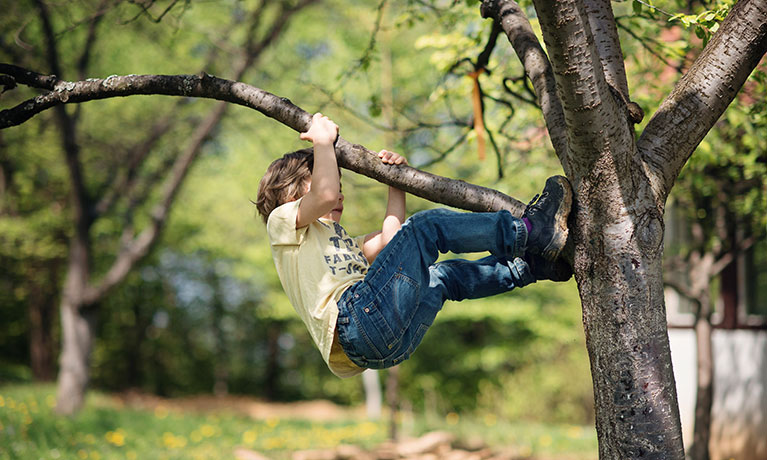Search
Coventry University research shows children who play adventurously are more active

A child climbing a tree
Tuesday 28 November 2023
Press contact
Children whose parents allow them to take more risks when playing are more likely to get their recommended amount of exercise, according to research by a Coventry University academic.
Alethea Jerebine, a post graduate researcher at Coventry University’s Research Centre for Physical Activity, Sport and Exercise Sciences and The School of Health and Social Development, Deakin University in Australia, has completed a study looking into parents’ attitudes to risk and injury, and their children’s play and physical activity.
Involving 645 parents across Australia, the joint study involving the two universities, found 78% weren’t keen on their children taking risks when they played, and put limits on things like climbing trees, riding bikes fast down hills and play-fighting.
Although most parents agreed that risk-taking play did have benefits for their children, almost four in five were unwilling to allow their children to play adventurously.
The study found that the children of parents with a more relaxed attitude to adventurous play, were around three times more likely to meet the Australian and UK physical activity guidelines of an hour a day of ‘huff and puff’ physical activity.
The research also found that mothers and fathers had similar views on adventurous play, but mothers were more concerned about play injuries than fathers. Parents with a single child were also more concerned about play injuries.
Research indicates the reasons why many parents are risk averse are complex, and we need to have wider community conversations about the types of play experiences children are provided with in our parks, playgrounds and schools. We need to make sure that we have enough spaces for children to play outdoors. Spaces that provide children with the opportunity to engage with risk when they play provide valuable learning experiences.
Obviously parents don’t want to see their children pick up serious injuries, but evidence suggests most play injuries are minor, and the potential rewards of risk experiences are great. We know that through taking risks when they play children learn about what they can and can’t do, build confidence and independence, as well as how to manage risk and keep themselves safe.
It’s important for children to develop their understanding of risk from an early age and build these skills incrementally. We don’t want children to grow up and the first time they’re exposed to risk is when they learn to drive, for example.
Alethea Jerebine, post graduate researcher at Coventry University’s Research Centre for Physical Activity, Sport and Exercise Sciences
Read more about Alethea’s research - Playing it safe: The relationship between parent attitudes to risk and injury, and children’s adventurous play and physical activity – ScienceDirect




